Greg Jacobs, DO, FACEP
Fellow in International Emergency Medicine/Global Health at UAB
Staff Emergency Physician at Southeast Health in Dothan Alabama
Pictures courtesy of Greg Jacobs
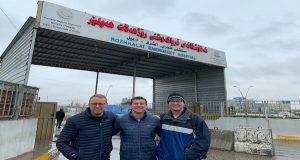
Returning to Iraq this time was different. Having invested over the last year in continued correspondence with those we had met previously on our first visit, we are building relationships and returned as friends and colleagues. Erbil, Iraq is a region where warm hospitality and complex volatile circumstances coexist. A region with a large influx of displaced refugees from areas of violent extremism and hatred. However, despite this reality, our experience was one of celebrity status welcomes and family like inclusion.
John Miller with OneVision International, Bryan Balentine, MD, FACEP and I returned to Iraq to link two often misperceived groups of people together through the practice of medicine.
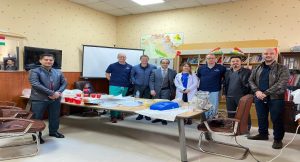
Over the past year we have purchased and provided donated medical equipment and humanitarian aid to support an emergency medicine residency training program at Rozhhalat Emergency Hospital. The program is the only one of its kind in the region and is training the newest generation of emergency physicians that will shape emergency care in this region of the world. This year we went with the goal of providing Advanced Cardiac Life Support (ACLS) certification and resuscitation lectures to a group of seventy physician colleagues at a variety of levels of training.
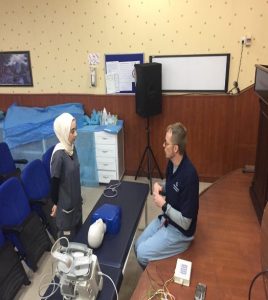
Bryanand I ran mock case scenarios to aide in the teaching and reinforcement of ACLS guidelines. This was a unique experience for these physicians as this type of training had never been offered previously in Iraq. In fact, we had an initial interest from one hundred thirty physicians but had to turn away sixty plus physicians due to lack of our resources and time. We spent two full, eight-hour days and an additional half day to complete the mock scenarios and lectures on resuscitation. The ACLS certification for these physicians required previous online study that we had set up for each of the students before our arrival. This was through a generous US based company that provides such certification to US physicians. Although we were able to obtain a reduced price for the certification course, there was still a significant cost to the individuals seeking certification. Many of these physicians were students.

Thousands of dollars were contributed by OneVision International and various donations, including our own. All of this to improve the care of human beings in this region of the world, and to build collegiality and friendships between western and middle eastern people. Working with an emergency medicine residency training program and its director, as well as the hospital director and local government made this a fruitful experience we hope to continue. Our future plans include helping to implement a triage system for this government funded facility that sees an average of eight hundred patients per day (the very busiest US hospitals see about two to three hundred per day).
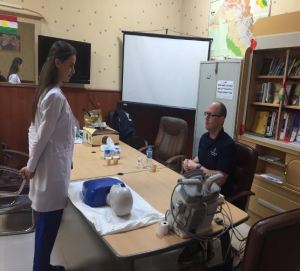 As it currently stands, patients are often brought in by family or other non-medical persons and dropped at the hospital in a chaotic environment. Often, these patients are seriously injured or ill with life threatening afflictions. Additionally, we hope to provide additional ACLS training and Pediatric Advanced Life Support (PALS) training as well as Advanced Trauma Life Support (ATLS). Plans for collaboration with a US based emergency medicine residency program at my institution and the program in Erbil are being discussed. Providing additional opportunities for education, research and training by using internet-based communication platforms and physician elective opportunities for Erbil emergency medicine residents to visit the US and vice versa are being planned.
As it currently stands, patients are often brought in by family or other non-medical persons and dropped at the hospital in a chaotic environment. Often, these patients are seriously injured or ill with life threatening afflictions. Additionally, we hope to provide additional ACLS training and Pediatric Advanced Life Support (PALS) training as well as Advanced Trauma Life Support (ATLS). Plans for collaboration with a US based emergency medicine residency program at my institution and the program in Erbil are being discussed. Providing additional opportunities for education, research and training by using internet-based communication platforms and physician elective opportunities for Erbil emergency medicine residents to visit the US and vice versa are being planned.
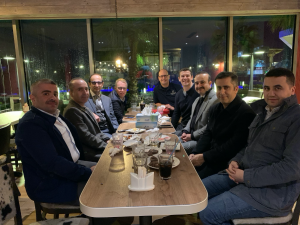
Why will I return? Because I always gain something I did not anticipate through these ventures, something that challenges me, shapes me, and gives me a much greater purpose.
